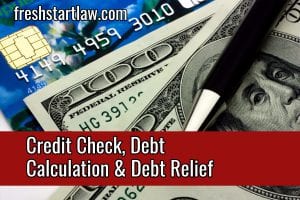Credit Check, Debt Calculation & Debt Relief

- Nearly 40 percent of Americans worry about paying their monthly bills.
- Almst one third of individuals have a credit score of less than 601 (“bad credit” level)
- The average U.S. household has a credit card balance of over $16,500 and owes over $130,000 total in loans.
In this article we’ll review how to check your credit score, calculate your debt, and look at ways to get debt relief.
Get answers to unpaid credit problems. Contact us for a free consultation.
Check Your Credit Score
Getting a credit score check is very easy. The website Annual Credit Report.com allows you to check your score for free once a year. The information in these reports is acquired through three consumer credit agencies: Equifax, Experian and TransUnion.
When you get your credit report, read it carefully. You may be surprised to find mistakes and possibly even credit information that isn’t yours. Any errors should be reported and corrected to help improve your credit score.
Although there are no strict guidelines, credit scores are generally classified as:
- 300-629: Bad credit
- 630-689: Fair or average credit
- 690-719: Good credit
- 720 or more: Excellent credit
Calculating Personal Debt
Knowing exactly how much debt you have can help you gain better control of your finances. Many households carry multiple types of debt such as credit card balances, auto loans, home mortgages and others. Since the numbers can be complex, online debt calculators (such as this one from CNN or this one from Key Bank) may be useful.
Improving Your Credit Score
We already mentioned one way of improving your credit score – correcting mistakes found on your credit report. But, the best way to improve your score in the long run is to pay your debts on time. For example, if you make late payments on your credit card, it hurts your score. A good credit score doesn’t mean you don’t have any debt. It means you pay your debts on time, every time.
Getting Out Of Debt
Once you know your credit score and total debt burden, you can begin working towards debt reduction. Here are some methods that might be useful:
- Debt consolidation – Combine some or all debts into one payment. This can eliminate the confusion of dealing with multiple payments each month and in some cases may even lower your monthly payment. Be sure to compare interest rates and consider fees.
- Refinancing – Pay off old debts with new ones for loans such as car loans. If the interest rate is lower, this option could save you a lot of money.
Declaring Bankruptcy
Sometimes, no matter how much you try, your debt burden may be overwhelming. In some cases, declaring bankruptcy may be the most advantageous solution for your financial situation. Bankruptcy is a legal process that can help you resolve issues with credit card debt, medical bills, and even stop lawsuits and wage garnishments.
If you’re seeking debt relief, it’s important to consider all options, weigh the pros and cons associates with each associated with each scenario, and ultimately move toward getting back on track financially.
Considering bankruptcy? Get expert advice. Contact us for a free consultation.
